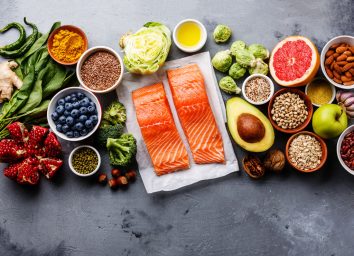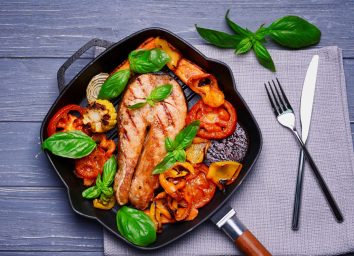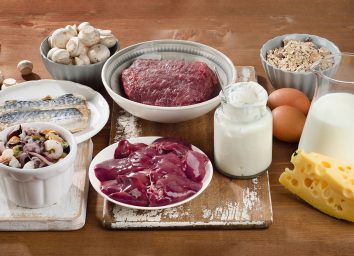7 Warning Signs You’re Not Getting Enough Iron
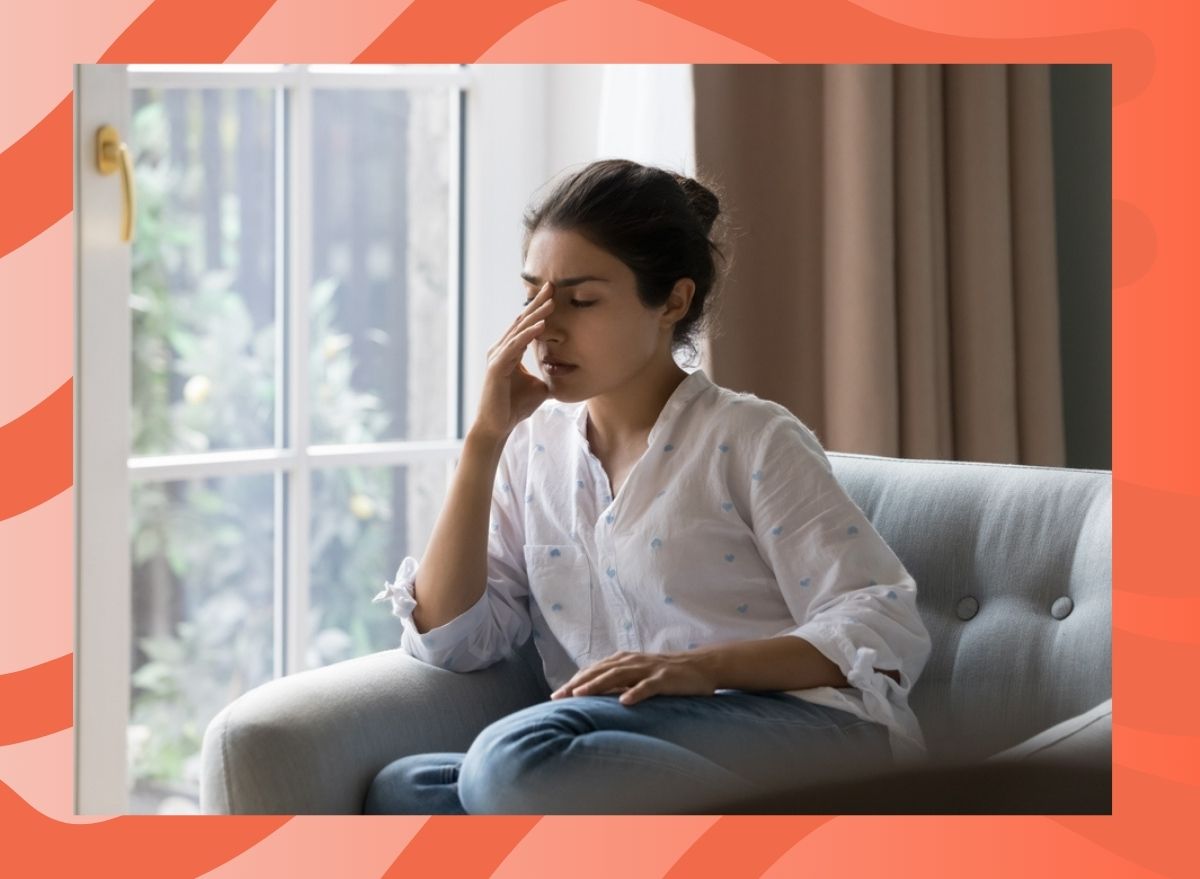
Iron might just be the secret superhero of our bodies—without the fancy cape, but with all the incredible powers! This mighty mineral courses through our veins, quite literally, playing a pivotal role in transporting oxygen and keeping our energy levels from dipping lower than our mid-day motivation at work.
Iron’s superhero status doesn’t end with energy levels; it’s also the foundation for the production of hemoglobin, a critical component of our red blood cells. This complex protein acts as the oxygen-carrying vehicle, ensuring that every part of our body gets the oxygen it needs to function effectively. Without adequate iron, our bodies can’t produce enough healthy red blood cells, leading to a condition known as iron-deficiency anemia. This condition can manifest as fatigue, weakness, and a reduced ability to focus, highlighting iron’s indispensable role in maintaining our health and vitality.
The World Health Organization has recognized iron deficiency anemia (IDA) as the most common nutritional deficiency in the world, with 30% of the population being affected by this condition. Teenage girls appear to be increasingly susceptible to this condition, as their diets tend to be lower in foods that contain this mineral (per the Dietary Guidelines for Americans), and they lose significant iron during the start of menstruation. According to data published in JAMA Network, iron deficiency affected almost 40% of US females aged 12- to 21-year-old between 2003 and 2020. Iron deficiency anemia affected 6% of this population according to the same report.
How to know if you have an iron deficiency
Those with iron deficiency, if left untreated, can experience significant cognitive impairment and poor quality of life. Bottom line? keeping your iron status in check is incredibly important. The most reliable method to determine if you have an iron deficiency is to get a blood test, such as a serum ferritin test, which measures the amount of stored iron in your body, as well as a complete blood count (CBC), which can indicate if you have anemia related to low iron levels.
While inadequate iron stores can be a result of low intake of iron foods, like lean red meat and fish, it can also be a sign of underlying conditions like a gastrointestinal bleed.
If you have any of these symptoms, it may be a sign that you should get a blood test to determine if you have inadequate iron stores. If you do, in fact, have one of these conditions, your healthcare provider will help you determine your best mode to get your iron levels back to a healthy level so you can feel your best.
Read on to learn about some of the warning signs that you’re not getting enough iron. Then, check out the 18 Best Iron-Rich Foods You Can Eat.
You feel tired.

One telltale sign of iron deficiency is unusual tiredness or fatigue. This symptom arises because your body relies on iron to make hemoglobin, a protein in red blood cells that enables them to carry oxygen around the body. When iron levels are low, the body can struggle to transport sufficient oxygen to your tissues and organs, leading to a persistent feeling of exhaustion.
You have spoon nails.
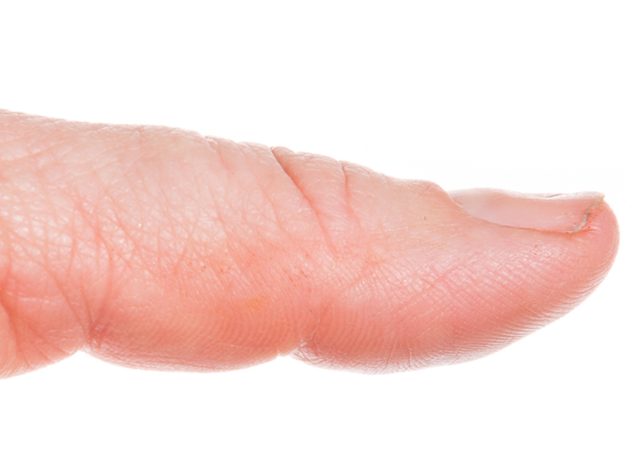
One tell-tale sign of iron deficiency is the appearance of spoon nails, medically referred to as koilonychia. In this condition, the nails become thin and concave, resembling the shape of a spoon. This symptom reflects more than just a cosmetic concern; it can indicate inadequate iron levels in the body, affecting hemoglobin production and overall health.
You are frequently cold.

One telltale sign of iron deficiency is an increased sensitivity to cold temperatures. Individuals with insufficient iron levels may find themselves feeling unusually cold or having cold hands and feet, even in relatively warm environments. This occurs because iron plays a crucial role in hemoglobin production, which is essential for oxygen transportation in the body, influencing our internal temperature regulation.
You have poor academic performance.

For children, inadequate iron intake, over time, may manifest as poor academic performance. In one study, average math scores were lower for iron-deficient children compared with children with normal iron status.
A systematic review of fifty studies published in Nutrients suggested that iron status and anemia may be associated with academic performance in some contexts and that iron supplementation during adolescence may improve school performance, attention, and concentration, but more high-quality research is needed to make a recommendation. It is also important to remember that many factors play into academic performance beyond iron intake.
You experience poor sleep.

Adequate iron levels in the body aid in the production of serotonin and dopamine, which are neurotransmitters essential for regulating sleep cycles. Data shows iron deficiency is linked to lower sleep quality, sleep disorder breathing, and other factors that are sleep-related.
You experience anxiety.
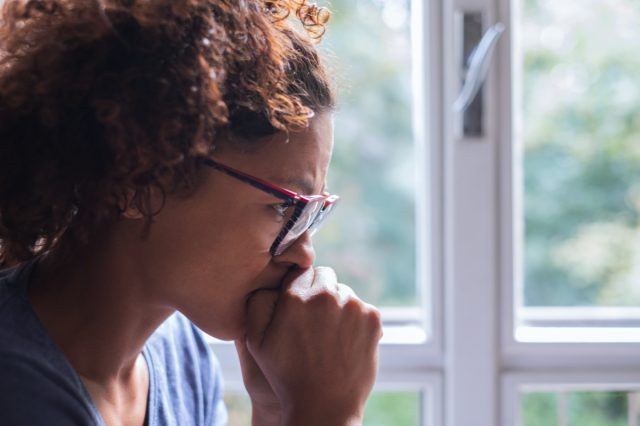
Anxiety can stem from a variety of sources, ranging from genetic factors to life experiences. Less known is that inadequate iron may be linked to increased anxiety, too. Iron is crucial for supporting brain health, affecting neurotransmitter synthesis and brain function.
You crave ice.
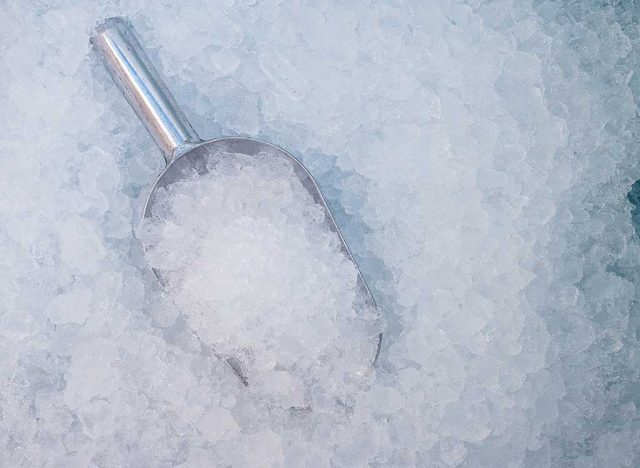
One intriguing sign of iron deficiency is a condition known as pica. Pica is characterized by cravings for substances that have no nutritional value, such as ice, dirt, clay, or starch. This unusual eating behavior is often a body’s way of signaling a lack of essential nutrients, such as iron. Pregnant women and preadolescents are at the highest risk of pica.
- Source: Abbaspour N, Hurrell R, Kelishadi R. Review on iron and its importance for human health. J Res Med Sci. 2014 Feb;19(2):164-74. PMID: 24778671; PMCID: PMC3999603.
- Source: Iron deficiency anemia - Symptoms & causes - Mayo Clinic. (2022, January 4). Mayo Clinic. https://www.mayoclinic.org/diseases-conditions/iron-deficiency-anemia/symptoms-causes/syc-20355034
- Source: Kumar A, Sharma E, Marley A, Samaan MA, Brookes MJ. Iron deficiency anaemia: pathophysiology, assessment, practical management. BMJ Open Gastroenterol. 2022 Jan;9(1):e000759. doi: 10.1136/bmjgast-2021-000759. PMID: 34996762; PMCID: PMC8744124.
- Source: Dietary Guidelines for Americans. (n.d.). https://www.dietaryguidelines.gov/sites/default/files/2020-12/Dietary_Guidelines_for_Americans_2020-2025.pdf
- Source: Weyand, A. C., Chaitoff, A., Freed, G. L., Sholzberg, M., Choi, S. W., & McGann, P. T. (2023). Prevalence of Iron Deficiency and Iron-Deficiency anemia in US females aged 12-21 years, 2003-2020. JAMA (Chicago, Ill.), 329(24), 2191. https://doi.org/10.1001/jama.2023.8020
- Source: Hanif N, Anwer F. Chronic Iron Deficiency. [Updated 2023 Aug 8]. In: StatPearls [Internet]. Treasure Island (FL): StatPearls Publishing; 2024 Jan-. Available from: https://www.ncbi.nlm.nih.gov/books/NBK560876/
- Source: Neidlein S, Wirth R, Pourhassan M. Iron deficiency, fatigue and muscle strength and function in older hospitalized patients. Eur J Clin Nutr. 2021 Mar;75(3):456-463. doi: 10.1038/s41430-020-00742-z. Epub 2020 Sep 8. PMID: 32901103; PMCID: PMC7943415.
- Source: Satasia M, Sutaria AH. Nail Whispers Revealing Dermatological and Systemic Secrets: An Analysis of Nail Disorders Associated With Diverse Dermatological and Systemic Conditions. Cureus. 2023 Sep 11;15(9):e45007. doi: 10.7759/cureus.45007. PMID: 37701161; PMCID: PMC10494485.
- Source: Brigham D, Beard J. Iron and thermoregulation: a review. Crit Rev Food Sci Nutr. 1996 Dec;36(8):747-63. doi: 10.1080/10408399609527748. PMID: 8989508.
- Source: Iron Deficiency and Cognitive Achievement Among School-Aged Children and Adolescents in the United States. (n.d.). https://www.researchgate.net/publication/11950545_Iron_Deficiency_and_Cognitive_Achievement_Among_School-Aged_Children_and_Adolescents_in_the_United_States
- Source: Samson KLI, Fischer JAJ, Roche ML. Iron Status, Anemia, and Iron Interventions and Their Associations with Cognitive and Academic Performance in Adolescents: A Systematic Review. Nutrients. 2022 Jan 5;14(1):224. doi: 10.3390/nu14010224. PMID: 35011099; PMCID: PMC8746955.
- Source: Kim J, Wessling-Resnick M. Iron and mechanisms of emotional behavior. J Nutr Biochem. 2014 Nov;25(11):1101-1107. doi: 10.1016/j.jnutbio.2014.07.003. Epub 2014 Aug 2. PMID: 25154570; PMCID: PMC4253901.
- Source: Murat S, Ali U, Serdal K, Süleyman D, İlknur P, Mehmet S, Bahattin A, Tunahan U. Assessment of subjective sleep quality in iron deficiency anaemia. Afr Health Sci. 2015 Jun;15(2):621-7. doi: 10.4314/ahs.v15i2.40. PMID: 26124812; PMCID: PMC4480468.
- Source: Leung, W., Singh, I., McWilliams, S., Stöckler, S., & Ipsiroglu, O. (2020). Iron deficiency and sleep – A scoping review. Sleep Medicine Reviews, 51, 101274. https://doi.org/10.1016/j.smrv.2020.101274
- Source: Kim J, Wessling-Resnick M. Iron and mechanisms of emotional behavior. J Nutr Biochem. 2014 Nov;25(11):1101-1107. doi: 10.1016/j.jnutbio.2014.07.003. Epub 2014 Aug 2. PMID: 25154570; PMCID: PMC4253901.
- Source: Borgna-Pignatti C, Zanella S. Pica as a manifestation of iron deficiency. Expert Rev Hematol. 2016 Nov;9(11):1075-1080. doi: 10.1080/17474086.2016.1245136. Epub 2016 Oct 19. PMID: 27701928.

